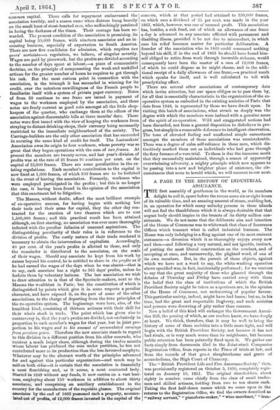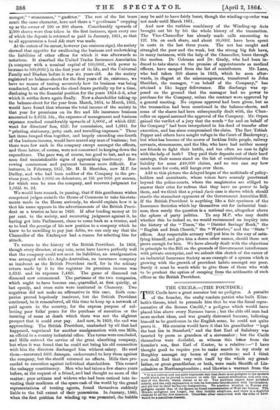A PAGE IN THE HISTORY OF INDUSTRIAL ASSURANCE.
THE first assembly of gentlemen in the world, as its members delight to call it, spent before the recess some six or eight hours of its valuable time, and an amazing amount of steam, scalding hot, in an operation for which many unlucky persons in these islands will not feel the thankfulness which it is always desirable that that august body should inspire in the breasts of its thirty million con- stituents. We do not mean that the deliberate aim and intention of the House of Commons was to whitewash that class of Insurance Offices which transact what is called industrial business. The House was only indulging in a fling against one of its most eminent statesmen—a diversion which it so thoroughly enjoys every now and then—and following a very natural, and not ignoble, instinct, of putting the most liberal construction on the conduct, and of accepting at once, and unreservedly, the plighted word, of one of its own members. But, in the pursuit of these objects, against which we have not a word to say, the white-washing operation above specified was, in fact, incidentally performed ; for we venture to say that the great majority of those who glanced through the debates of Thursday and Friday have carried away with them the belief that the class of institutions of which the British Provident Society might be taken as a specimen are, in the opinion of the House of Commons, not undeserving of popular favour. This particular society, indeed, might have had losses; but so, in his time, had the great and respectable Dogberry, and such societies and persons were deserving of pity rather than censure.
Now a belief of this kind will endanger the Government Annui- ties Bill, the passing of which, as our readers know, we have deeply at heart. We think, therefore, that it may be well to bring the history of some of these societies into a little more light, and will begin with the British Provident Society, not because it has not had rivals, or is very much worse than its neighbours, but because public attention has been pointedly fixed upon it. We gather our facts simply from documents filed in the Joint-stock Companies Registration Office, from reports in the Times of trials at law, and from the records of that greet slaughterhouse and grave of scoundrelisms, the High Court of Chancery.
The "British Provident Life and Fire Assurance Society," then, was provisionally registered on October 5, 1850, completely regis- tered on January 10, 1851. The original shareholders, about eighty in number, came chiefly from the class of small trades- men and skilled artisans, holding from two to ten shares each. Taking the first half-dozen names which we come upon in the returns to the Registration Office, to find the owners described as 7.4 "railway servant," "pianoforte-maker," "wine merchant,'' "iron
monger," "stonemason," " gasfitter." The rest of the list bears much the same character, here and there a " gentleman " cropping up as the owner of 100 or 200 shares. Considerably upwards of 2,000 shares were thus taken in the first instance, upon every one of which the deposit is returned as paid in January, 1851, so that to all appearances a bond fide start was made.
At the outset of its career, however (an ominous sign), the society showed that appetite for swallowing the business and undertaking the liabilities of other offices for which it was afterwards so notorious. It absorbed the United Trades Insurance Association (a company with a nominal capital of 100,000/, with power to increase to 500,0000 in the first year of its life, and the Universal Family and Diadem before it was six years old. As the society registered no balance-sheets for the first years of its, existence, we have no means of testing accurately how its business was being Conducted, but afterwards the cloud draws partially up for a time, diaoloaing to us the financial position for the years 1854-5-6, after which it settles down again finally. Now a shareholder taking up the balance-sheet for the year from March, 1854, to March, 1855, Would have found that whereas the total income of the society in that year for premiums on its fire and life insurance business amounted to 3,915/. 16s., the expenses of management and business expenses reached considerably upwards of 5,000/., of which 532/. went for directors' fees, 632/. for commission, and 1,381/. for "printing, stationery, petty cash, and travelling expenses." These last items lumped thus together, and largely exceeding one-fourth of the business income, would have scared any man of business; but there were few such in the company except amongst the officers, and these litter, of course, were not concerned in keeping down the expenditure. The pace was, of course, too good to last, and so we soon find unmistakeable signs of approaching insolvency. Bor- rowing commences and payment becomes more difficult. For instance, in February, 1857, -Mr. H. B. Sheridan, now M.P. for Dudley, and who had been auditor of the Company in the pre- vious year, lends 1,000/. on debenture, at 10/. per 100/. per annum, for which sum he sues the company, and recovers judgment for 1,0651. 8s. 2d.
We would here remark, in passing, that if this gentleman wishes competent judges outside the House of Commons to take his state- ments made in the House seriously, he should explain how it is that his name appears in the advertisements of the British Provi- dent as a trustee as late as 1859. If after lending money at 10 per cent. to the society, and recovering judgment against it, he haying got into Parliament, chose to come back as a trustee, and so to lend the prestige of his new position to a company which he knew to be unwilling to pay just debts, we can only say that the Chancellor of the Exchequer had a reason for selecting him for attack.
To return to the history of the British Provident. In 1858, though every director, at any rate, must have known perfectly well that the company could not meet its liabilities, an amalgamation was arranged with ths Anglo-Australian, an insurance company as insolvent as the British Provident itself, for in the solitary return made by it to the registrar its prenxium income was 5,635/. and its expenses 7,482/. The game of diamond cut diamond now commenced. The partizans of the two companies, which ought to have become one, quarrelled, at first, quietly, at last openly, and cross suits were instituted in Chancery. Two negatives did not make an affirmative in this case. Both com- panies proved hopelessly insolvent, but the British Provident continued, be it remembered, all this time to keep up a network of paid agents in the country, for the express purpose of col- lecting poor folks' pence for the purchase of annuities or the insuring of sums at death which there was not the slightest prospect that it could ever pay. And now, in 1859, the end was approaching. The British Provident, unabashed by all that had happened, negotiated for another amalgamation with one Mills, an official in a country industrial office. The terms were concluded, and Mills entered the service of the great absorbing company, but when it was found that he could not bring his old connection with him the directors discharged him withont salary. He sued them—recovered 5001. damages, endeavoured to levy them against the company, but the sheriff returned no effects. Mills then pro- ceeded to execution against individual shareholders. This roused the unhappy constituency. Men who had taken a few shares years before, at the request of a friend, and had thought no more of the matter; poor artizans and widows who had been enticed into in- vesting their modicum of the spare cash of the world by the grand representations of touting agents, found themselves suddenly liable to the full extent of their possessions. In January, 1860, when the first petition for winding up was presented, the bubble may be said to have fairly burst, though the winding-up order was not made until March 1861.
And now the ruthless machinery of the Winding-up Acts brought out bit by bit the whole history of the transaction. The Vice-Chancellor has already made calls amounting to 12/. 10s. on each share, and about 20,000/. have been spent in costs in the last three years. The net has caught and strangled the poor and the weak, but the strong big fish have, in many instances, with the help of the Chancellor, burst through the meshes. Dr. Coleman and Dr. Grady, who had been in.- duced to take shares on the promise of appointments as medical officers, have escaped from the list of contributers. Mr. Lane, who had taken 300 shares in 1855, which he soon after- wards, in disgust at the mismanagement, transferred to John Sheridan, the manager, "on behalf of the Company," has attained a like happy deliverance. His discharge was op- posed on the ground that the manager had no power to purchase for the Company, unless the contract were approved by a general meeting. No express approval had been given, but as the transaction had been mentioned in the balance-sheets, and some of the shares had been subsequently dealt with, the Chan- cellor on appeal assumed the approval of the Company. Mr. Orpen gained the verdict of a jury that the words "for and on behalf of the Company" had been interpolated in his deed of transfer after execution, and has since compromised the claim. The Rev. Tobiah Pepper and others have sought refuge in the Court of Bankruptcy; but what has become of the scores of luckless little people, railway servants, stonemasons, and the like, who have had neither money nor friends to fight their battle, and too often no case to fight with the help of both? They paid their deposits out of their hard earnings, their names stand on the list of contributories and the liability for some £40,000 claims, and no one can say how much more for costs, still hangs over them.
Add to this picture the delayed hopes of the multitude of policy- holders and annuitants, whose voices have scarcely penetrated: beyond the police-courts, where the magistrates are obliged to answer their cries for redress that they have no -power to help them, and we think that a prima fade case is shown which should startle the staunchest opponent of the Government Annuities Bill: If the British Provident is anything like a fair specimen of the Insurance Societies which lay themselves out for industrial busi- ness, then surely the question is a national one, altogether above the sphere of party politics. To any M.P. who may doubt whether this be indeed so, we would recommend an inquiry into the history of the "Times," the "District Savings' Bank," the "English and Irish Church," the "Waterloo," and the 'State" offices. Any respectable actuary will put him in the way of satis- fying himself, and give him a dozen other names, should these not prove enough for him. We have already dealt with the objections in principle to the Bill on the grounds of Government interference with private enterprise, and we submit this sketch of the career of an industrial Insurance Society as an example of a system which is growing with the growth of provident habits amongst our poor. Surely it must be worth while to give those of them who wish to be prudent the option of escaping from the arithmetic of such offices as the British Provident.



































 Previous page
Previous page